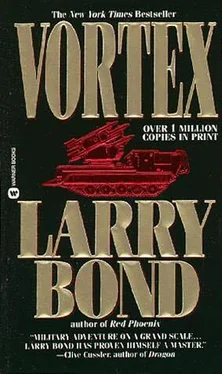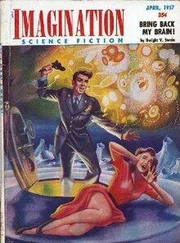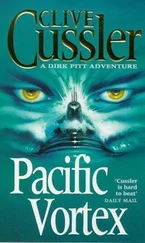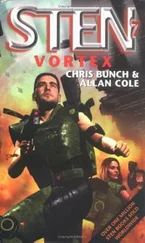Slowly forming smiles on several of the faces around the table showed that many of his colleagues saw the same advantages. But not all. Both the foreign minister and the defense minister looked unconvinced.
The President frowned. Consensus still eluded him, Very well, perhaps he could offer them a face-saving compromise. He rapped the table briskly.
“Comrades, I think we have discussed this issue long enough. What I propose is this: we will back Cuba’s preliminary military buildup while withholding final approval for the invasion itself. That can await further developments in Namibia and in South Africa itself. And we shall insist on absolute secrecy. In that way, we can keep our options open.”
He locked glances with the foreign minister. “if nothing else, such a troop buildup might give us a stronger bargaining position in any negotiations to end the Namibian conflict. True, Alexei?”
The foreign minister bowed his head slightly, acknowledging the point.
“Good. Then this matter is settled. We’ll inform President Castro that his plans can proceed-though with the conditions I’ve outlined. Clear?”
Heads nodded around the table, some with enthusiasm, others with evident reluctance.
Keys rattled in the corner as one of the Defense Council’s secretaries typed the President’s decision into the electronic record. Fidel Castro would get the ships, planes, and supplies he needed to prepare his counter stroke against Pretoria.
SEPTEMBER 15-NATIONAL SECURITY COUNCIL MEETING, THE WHITE HOUSE
It was one of the fine, crisp mid-September mornings that made summer in the District of Columbia bearable. If you could somehow hang on through the sticky steam-bath days of July and August, a cool, clean breeze was bound to come along to drop the temperature and blow away the smog.
The change in the weather was invigorating, and even two floors below ground level its effects could be seen in the faces of the men and in their conversation as they waited for the Vice President to arrive.
Their upbeat attitudes masked underlying worry. Although this was a regularly scheduled NSC session, there was only one topic on the agenda-the situation in southern Africa. The unspoken sense of crisis was reflected in the names and ranks of those present. WM the sole exceptions of the secretaries of state and defense, all of the NSC’s principal members had come themselves-each accompanied by a small entourage of aides.
The secretary of state was in Europe, consulting directly with America’s
NATO allies over events in southern Africa. The secretary of defense was tied up on a more prosaic task-touring a series of West Coast military bases earmarked for closure and sale. Flying either man home in time for the meeting would only have created unwelcome media attention.
Nevertheless, the majority of the administration’s brain trust sat around a crowded table in the Situation Roomassembled two floors below the green lawns and rose gardens of the White House in an effort to try to unscrew the inscrutable.
A low buzz of conversation and muttered speculation died instantly as
Vice President James Malcolm Forrester strode past the Marine sentries at the door. His manner was hurried as he took his seat and pulled a thick manila folder from his leather portfolio.
“Sorry for the delay, ladies and gentlemen, but I’ve just received additional guidance from the President about the Namibian war and our response to it. ” He turned to the short, bearded man seated across the table.
“Ed, why don’t you bring everybody up-to-date? No sense in going ahead until we’ve all got the same information. “
“Yes, sir.” Assistant Secretary of State Edward Hurley looked collected and organized as he rose from his chair and leaned forward to turn on an overhead projector.
Forrester ignored a disappointed frown from the deputy secretary of state. Whitworth might be Hurley’s immediate superior, but he didn’t have the detailed knowledge necessary to handle the briefing. Besides,
Forrester had long suspected that the State Department’s number two man was one of those “highly placed officials” who enjoyed leaking stories that made him look bad.
An aide near the door dimmed the lights slightly.
Hurley placed his first slide on the glass. Though clearly put together at the last minute, it was also well laid out and clear-a rare quality in Washington, D.C.
“This slide lists
important events that have occurred since our meeting a week ago. As you can see, only three of the fourteen involve military incidents in Namibia.
The rest are political events, guerrilla attacks, or serious civil disturbances.”
Jesus. Forrester scanned the chart while Hurley rattled off a quick summary of each event. At first glance, the fighting in Namibia seemed almost a sideshow compared to what was happening inside South Africa’s own borders. South Africa’s population was at war with itself. Between guerrilla bombings, black-on-black power struggles, and the government’s
I I security measures,” hundreds of people were dying every week.
Hurley replaced the chronology with a map, labeled Top SECRET.
“According to all available sources, this is the present disposition of Cuban and
South African forces in Namibia. Essentially, the military stalemate continues. There have been no significant advances or retreats for weeks.
Just a steady series of artillery bombardments and small-scale, but costly, infantry assaults. “
Forrester nodded somberly. He’d seen the South African casualty estimates produced by the Defense Intelligence Agency. Forty-five dead and more than one hundred and fifty wounded in the past week alone. That didn’t sound like much of a war. Not until you remembered how small South
Africa’s white population really was. On a proportional basis, Pretoria’s
Namibian losses over the last seven days were the equivalent of more than 2,200 dead and 7,500 wounded Americans.
He stared at the unit symbols shown on the map-most clustered in the mountains south of Windhoek. South Africa’s mechanized and motorized battalions were nearly immobile -forced to remain in place while an inadequate logistics system tried desperately to stockpile the fuel reserves needed for a renewed offensive.
In the meantime, both sides were continuing their troop strength buildups. Total South African strength in Namibia had climbed by nearly a brigade-an increase matched by the Cubans. Castro, unworried by any serious external threat,
evidently felt able to commit an even greater share of his reserves to the region.
Hurley placed another chronology on the projector.
“These are events in the region that either affect or are affected by the war in Namibia. All of the front line states-Mozambique, Zimbabwe, and Botswana-are being forced to cope with dramatically increased guerrilla activity. Most are insurgencies we know are supported by Pretoria. ” He pointed to a separate heading near the bottom.
“Unita has also been very active, almost certainly at South
Africa’s request. Unita guerrillas have been attacking Angolan rail lines and bridges, trying to slow down any Cuban reinforcements on their way south to Namibia.”
Forrester scowled and made a note. Unita’s de facto support for South
Africa’s Namibian adventure was a sore point in Washington. The anticommunist Angolan guerrilla movement happened to be supported by both the United States and South Africa-one of the few places where the foreign policies of the two countries coincided-much to Washington’s chagrin.
Unita’s willingness to complicate Cuba’s troop movements into Namibia was understandable. The guerrillas rightly viewed Castro’s troops as an occupying army. But that didn’t make their aid for South Africa’s invasion any more palatable or wise. Not given the current situation.
Читать дальше












